- Home
- Karen Marie Moning
The Highlander's Touch Page 26
The Highlander's Touch Read online
Page 26
She went very still.
It is said that if you circle the mound seven times and spill your blood upon the peak, the Queen of the Fairies may appear and grant you a wish.
Recalling Circenn’s words, she slowly opened her eyes.
But what would she wish?
I cannot guess how many young lads and lasses have pricked their fingers here. Old, tall tales—this land is full of them. Most likely some prior kin once emptied the chamber pots here. It would explain how thick and green the grass is.
But she didn’t know what might happen next in her life. Why not try it? She could decide upon a wish later, if it worked.
Numbly, she stood and began circling the shian. Slowly at first, then picking up speed and determination as she progressed around the mound.
One time, three times, five, then seven.
She stopped. She realized she didn’t have anything to cut herself with. With a peculiar detachment, she pierced the heel of her palm with her teeth, drawing blood. She ascended to the peak of the shian and, applying pressure with her fingers, forced the droplets to fall on the center of the mound.
She waited.
She had no idea what she expected, if anything. But considering how strange her life had been for the past few months, it would not surprise her overmuch if a fairy sprang from the earth, waving a magic wand.
She held her breath. The night was eerily still, even the night creatures strangely mute.
Nothing happened.
Oh, Lisa—no Fairy Queen will spring from this mound, and you will simply have to deal with the fact that you are in love with an immortal man.
She closed her eyes and shook her head, amused by her foolish fancy. After a moment more, she descended the unusually symmetric pile of sod.
This land had definitely done something to her blood. She’d nearly believed that a mythical creature would appear. Magic pervaded Scotland’s air as thick and frequent as the mist, and she’d discovered little that seemed beyond the realm of possibility. Circenn was immortal. She had traveled through time. Making a wish seemed very reasonable in comparison.
She turned her back on the mound, tilted her head, and gazed at the moon, admitting that despite her hurt and fear, she was more than a little relieved. Too many choices could be overwhelming. Now she had none; she had no choice but to stay there and love Circenn Brodie.
Perhaps she would learn to view aging, while he remained ageless, as a small price for the kind of love they shared. She felt for him with her inner senses, slowly removing her earlier barricades. From their bond, she knew he was hurt, angry, and deeply worried. He was also consumed with fear that she would somehow try to leave him.
Well, he needn’t worry about that. She couldn’t.
“What shall you wish, human?” A voice that held a thousand cool shades of snow shattered her reverie, chilling her blood.
Lisa froze.
THE VOICE HAD COME FROM BEHIND HER, WHERE THE fairy mound lay.
“You were watching the moon, as one entranced. Do you wish to fly to it? To count the stars as you touch them? Or something more … earthy?”
Lisa drew a deep breath as the voice shivered through her. Not a mortal voice. She could never mistake such a sound for a mortal voice. It resonated with time and with passionless observation. It frightened her. She turned slowly on her heel. The sight that greeted her was frightening only in the magnitude of its beauty. The air caught in her windpipe, forcing her to draw rapid, shallow breaths.
“Lovely,” she whispered. “Oh, God.” She suddenly understood the lure of fairy tales, of creatures who were so blindingly beautiful that it nearly hurt to look at them. This creature overwhelmed her senses.
The vision inclined her head regally. “We are. Lovely, that is. But not gods. Most call us children of the Goddess Danu.”
Lisa stared, lips parted on a sigh, mesmerized. The woman had silver hair—moonbeams had brushed her delicate head, loath to depart. The night air shimmered around her, as if lit by a thousand tiny suns. Her brows arched above exotic almond-shaped eyes in a pale face. And her eyes—they were of no color known to man, but conjured images of the iridescent hues of a mermaid’s wet tail gleaming in the sun.
Her cheekbones were so high that they lent her face a feline cant, and her lips were full, blood-red, and uptilted at the corners as if caught in a perpetual smile. Her skin was dusted with gold; a sheer gown of white clothed her without covering a thing, and the body that was clearly visible beneath the shimmering fabric sparkled gilded pearl and rose, and made Lisa feel like she was twelve years old.
Perfection.
“What shall you wish, human?” Remote eyes held hers, widened by the barest hint of curiosity. “You made this door with your own blood, now wish before I weary of you.”
Lisa swallowed. Here was her chance. All she had to say was, I want to go home to my mother. But could she leave Circenn? And how could she know whether her mother was still alive?
“Yes,” the Fairy Queen said, tucking a strand of moonbeam behind her ear.
“What?” Lisa gasped.
“Your mother lives. If you call that living.” Her lips shaped a moue of distaste. “A mortal bane, the body. She is dying.”
“How did you know what I was thinking?” Lisa whispered.
The fairy laughed and the sound slithered around Lisa. For a moment, she lost herself in it: forgot who she was, that she had a mother, that she loved a man, that she was human. For an instant she wanted nothing more than to linger as close to this creature as she would permit. To kiss the hem of her fairy skein, to breathe her exhales, to dance barefoot upon a mound of green. She recognized it for an enchanted madness, when the compulsion eased as the laughter faded.
“I am of the Tuatha de Danaan. We see all. So what shall it be, human? Shall I send you home to die with your mother? Is she so important? Shall you leave this lord who loves you?”
“I need time to think,” Lisa protested faintly.
“You summoned me now.”
“I didn’t really think it would work. I have not prepared my wish—”
“If thou needed time to think, thou should not have disturbed me.” The Fairy Queen’s face grew thunderous. A breeze kicked up around the shian, tossing leaves into the air. Lisa was startled, turning around, absorbing the suddenly charged night. Charged by the Fairy Queen’s displeasure.
“We are Scotland,” the Queen stated, observing the disturbance. “The land once wept when we wept, and spring came when we danced. Now the seasons roll consistently, and aside from the fool’s pranks, this soil is mostly tame.”
“Because you are consistently detached, remote,” Lisa said, before thinking. “Has time done that to you?”
The Fairy Queen blinked. Just a blink, but it said, Tread not here, mortal, in a forbidding glance that promised wrath Lisa never wanted to experience.
Lisa recovered quickly from her fumble. “I meant, will my mother be alive if I return?”
“For a time.”
Lisa squeezed her eyes shut. She hadn’t really believed that the Fairy Queen would appear and grant her wish. But now here stood a being that could, and apparently was offering to return her to her mother.
How could she choose? To stay in Scotland and watch her body grow old and fall apart while her beloved never aged, or to return to her time and watch her mother die?
Neither choice was unanimously appealing.
“I don’t suppose you could bring my mother here? Maybe make her well?” Lisa suggested hopefully. “Perhaps you could make me immortal?”
“Two choices, human. Stay or go. I am not feeling generous, nor am I inclined to rearrange on a grand scale. It requires much will. A wish is a stone, and my granting is the toss into a loch. There are ripples. Shall I read your heart and find your true choice? You mortals think living is a war: Heart or mind? Silly child, guilt is not mind. Duty is not heart. Hear with that which your race claims we no longer possess. Shall I read your desire
?”
Lisa’s hand flew instinctively to her breast as if she could shield her heart from this creature. “No, I will choose, if you’ll just give me a few moments.”
“I weary of waiting. Would you like to see her?” The fairy unfurled a slim white hand toward the reflecting pool, and it grew glassy and still. Within the water, like a silvery portal, her mother’s bedroom took shape. It was dawn in the twenty-first century and Catherine was awake, a rosary clasped between her gnarled hands. Lisa cried out when she saw her, for illness had taken so much of her life that it was hard to believe she still breathed. She was praying aloud. She was alive!
During the past few weeks—convinced she would never see her again—Lisa had nearly laid her to rest in her heart, but her mother still lived and breathed and was missing her desperately, worried sick.
Lisa shook her head bitterly, confounded by her choices. The vision of her mother was a fatal blow. Catherine was alive in the twenty-first century, and after all these months she must certainly have given up Lisa for dead. But Lisa had the chance to go back and hold her hand, and reassure her that her only child was well. To hold her hand while she died. To comfort and love, and keep her from dying alone.
Emotions overwhelmed her, and dimly she felt Circenn panicking somewhere out in the night—reading her feelings. Firmly, she shut him out.
Lisa glanced again at the pool and suffered a killing vision of herself in Catherine; weakened by life, faded, a brittle wisp of desire to live, gazing up at Circenn, who would be untouched by time.
Circenn had given her love. Catherine had given her love. Circenn would live forever. Lisa knew how Catherine’s death was destroying her, breaking her heart. When she died, Circenn would be subjected to such pain. If she stayed what would she have? To grow old while Circenn never aged, to die while the magnificent warrior stood by her bed, holding her hand, his heart breaking. He, who had lost so many loved ones over five hundred years. Wouldn’t it be kinder to go now than to make him suffer her death in ten or thirty or fifty years? She knew intimately the pain of losing someone so deeply loved.
Her head hurt and the back of her throat burned with the effort of suppressing tears.
Lisa turned in a slow circle, taking a long look at Castle Brodie, the enchanted night, the beauty that was the Scottish Highlands. I love you with all my heart, Circenn, she willed into the night. But I fear I am a coward and have little stamina. The years would destroy me.
“Well?” the Fairy Queen demanded.
“Oh,” she gasped around a swift intake of air, jarred from her thoughts.
“Now,” the Queen pushed.
“I … oh … h-home,” she said so softly that the wind snatched it from her lips and it was nearly lost. But the Fairy Queen heard.
“What of the lord? Do you not wish to say farewell?”
“He is gone,” she said, tears slipping down her cheeks. “He’s on his way to Bannockburn—”
“Bannockburn!” The fairy stiffened, and looked nearly alarmed, although it was difficult to tell in such a face. She clapped her hands, spoke in a language Lisa couldn’t understand, and suddenly the night went mad around her.
The shian glowed, light rushed from within it, and Lisa was treated to a sight few humans ever glimpsed, or lived to tell of.
Fairies by the dozens poured from the shian, bursting into the night, mounted on mighty horses. A tempest blew up around her, tossing leaves and limbs, and the very earth seemed to strain as it loosed its strange cargo—the wild hunt.
“To Bannockburn,” they cried.
She had no idea how long it lasted, the mad surge of exotic creatures rushing by. The ground trembled, the moon hid nervously behind a cloud, even the trees seemed to draw back from the shian. Lisa couldn’t help it—near the end she had to close her eyes.
At last the night was silent and she cautiously peeped at the shian. A man stood there, tall, powerful, with silky dark hair, regarding her.
“They forget the time,” he said dryly. “Edward has more than triple the Scots’ troops, and my people have a vested interest in this battle. Circenn and his men will arrive in time to save the day. My people love to observe mortal triumphs and casualties.”
“Who are you?” Lisa gasped, praying he wouldn’t laugh. Sensuality dripped from the man, a sensuality that nearly competed with the effect Circenn had upon her. If he laughed as the Fairy Queen had, she feared she might lose herself in his seductive madness.
Send her, came the Fairy Queen’s bodiless command. And then you are free to leave my side.
What of my sifting time and weaving worlds? he demanded.
I withhold them still. You are restrained until I otherwise decree, Adam.
Adam made a furious gesture, then returned his attention to Lisa. “It seems your wish has been granted.” The corner of his mouth curved into a mocking expression of displeasure. “And they call me a fool.”
What right do you have to gaze at me with such disappointment? she thought, bewildered. Almost as if he cared. As if he felt she’d made a terrible decision. Then the Fairy Queen’s words sank in: Adam. “But wait—” Lisa began.
She never got to finish her sentence.
“Are you the Adam Black?” she yelled, flooded with murderous rage.
But it was too late. She was …
Falling …
Again …
* * *
Near the Ferh Bog, Circenn doubled over in his saddle and clutched his stomach. Deep rasping breaths exploded from his lungs and he stared into the night with dawning horror Galan and Duncan jerked to an immediate stop at his side.
“What is it? What is it, Circenn? Talk to me!” Duncan yelled. He’d never seen Circenn Brodie’s face so anguished.
“She is gone,” he whispered. “I cannot feel Lisa anymore.”
“What does this mean?” Duncan asked swiftly. “Has she somehow returned to her time?”
Circenn’s gaze was savage. “Either that—or Adam found her.”
“Why didn’t you give her the flask?” Duncan demanded. “Then this couldn’t have happened!”
Circenn nearly lunged from his mount at Duncan. “You argued against it when last we spoke.”
“But that was before Armand—”
“I didn’t have time!” Circenn roared.
“You must go back.”
“She’s gone,” Circenn said through tightly clenched teeth. “If she has left this century, it is too late for me to seek her. If Adam found her, it is too late for me to seek her. Doona you understand—it is one or the other, and either way it is already too late because she is gone.”
He raised his hand and slapped Duncan’s mount on the rump. “Now ride!” he commanded his troops. “Ride and avenge,” he swore softly, knowing that every Englishman who fell beneath his ax or his sword would bear Adam’s face.
THE BATTLE NEAR THE STREAM FROM WHICH IT TOOK ITS name—the Bannock Burn—lasted only two days, but they were two glorious days that resonated throughout the country, from end to end.
Edward Plantagenet’s troops assembled near the burn. They were boisterous, they outnumbered the Scots by five to one, and they were arrogantly certain that victory was scant hours away. They were mere miles from Stirling, they had a supreme advantage in numbers, and they still had two days to defeat the barbaric Scots.
Edward scoffed, joking with his men. It would take no more than two hours, he gloated.
The opposing troops engaged, and much to Edward’s dismay, over the course of the next two hours a large number of the English fell prey to the Bruce’s cleverly concealed pits and caltrops—spiked pieces of iron treacherously hidden in the brush.
Their confidence shaken by the concealed traps, they regrouped, having belatedly discovered that the Scottish front was virtually impenetrable.
Circling around to attack from the side would necessitate skirting the swampy Carse, while Scottish spearmen sat the high ground, waiting to pick them off.
Edwa
rd was chagrined by how well the Bruce had chosen his battle site, and how foolishly his troops had discounted the Scots’ abilities. The end of the first day saw Edward’s heavy horsemen repulsed twice, and large numbers of Englishmen slain.
The Bruce’s camp retired to the fringes of the forest of the New Park that night, elated by their success in repelling the English troops.
The English camp made their second deadly mistake by taking refuge in the soggy ground between the burn and the River Forth, a tactical error that would call its due in the morning.
When Sir Alexander Seton, a Scottish knight in Edward’s English army, defected late the first night, advising all who would listen that the Scots would win on the morrow, and if they didn’t he would willingly forfeit his own head, the English troops were further demoralized.
On the second day the English swiftly realized the error they’d made in choosing their campsite. The Scots descended upon them, trapping the English army immediately after their first charge, cornering them between the Bannock Burn and the River Forth, in a space too constricted for them to maneuver into formation for another charge.
The Scots had cunningly chosen their position, forcing the English to wage war on foot—a tactic for which they were grossly unprepared.
The Scots were far superior to the English on the ground, well accustomed to fighting in the swampy bogs and marshes, and free to move easily without the binding weight of armor.
The English began to break into unorganized formations, and it was at that weakened moment that the laird of Brodie arrived with his Templars. Into the fray they galloped as one, the holy knights ripping off their plaids, revealing the stark white robes and blood-red crosses of their Order.
Across the field of mud and broken bodies, the wave of brilliant white knights cut like a scythe of death. Many of the battle-weary, discouraged Englishmen simply turned and fled upon glimpsing the robes. The Templars were legendary for their invincibility in battle. Few encountered a warrior Templar and lived to tell of it. The Englishmen who were astute enough to notice that they rode into battle under the banner of the notorious laird of Brodie reared their mounts about and raced away from certain death.

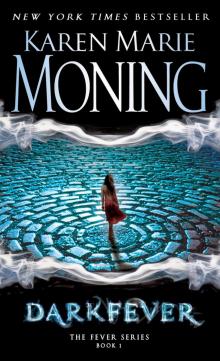 Darkfever
Darkfever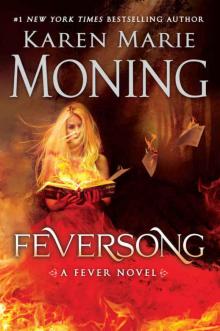 Feversong
Feversong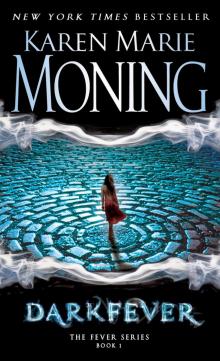 Faefever
Faefever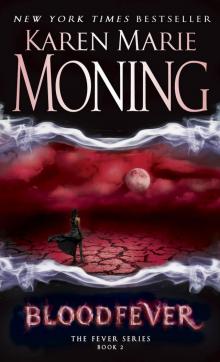 Bloodfever
Bloodfever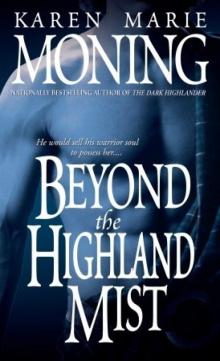 Beyond the Highland Mist
Beyond the Highland Mist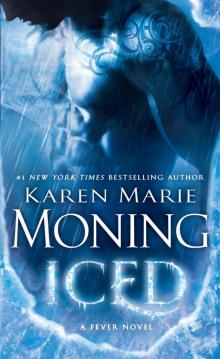 Iced
Iced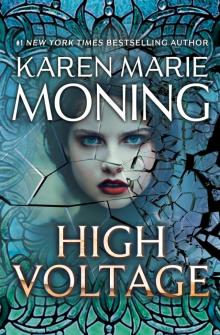 High Voltage
High Voltage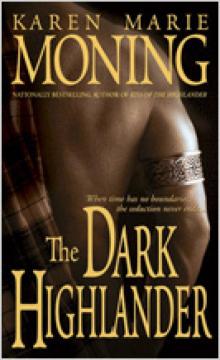 The Dark Highlander
The Dark Highlander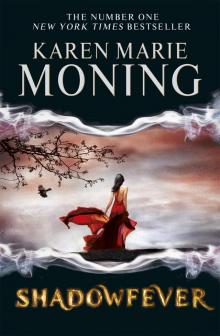 Shadowfever
Shadowfever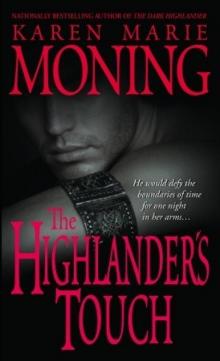 The Highlander's Touch
The Highlander's Touch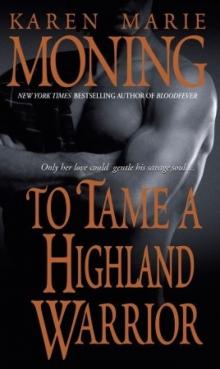 To Tame a Highland Warrior
To Tame a Highland Warrior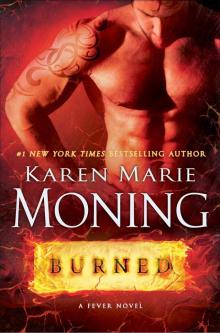 Burned
Burned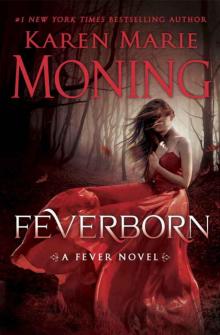 Feverborn
Feverborn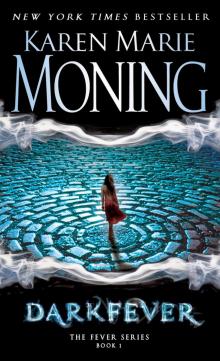 Dreamfever
Dreamfever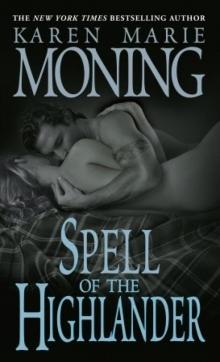 Spell of the Highlander
Spell of the Highlander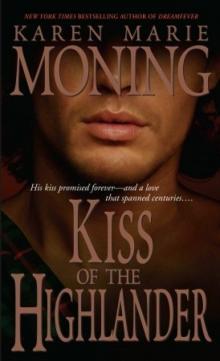 Kiss of the Highlander
Kiss of the Highlander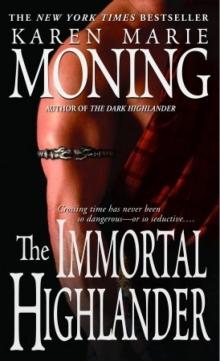 The Immortal Highlander
The Immortal Highlander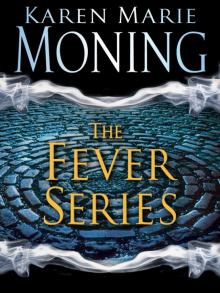 Karen Marie Moning’s Fever Series 5-Book Bundle: Darkfever, Bloodfever, Faefever, Dreamfever, Shadowfever
Karen Marie Moning’s Fever Series 5-Book Bundle: Darkfever, Bloodfever, Faefever, Dreamfever, Shadowfever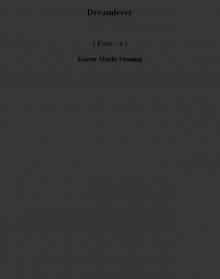 Dreamfever f-4
Dreamfever f-4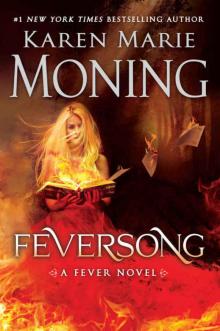 Feversong: A Fever Novel
Feversong: A Fever Novel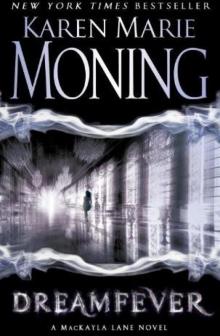 Dreamfever_The Fever Series
Dreamfever_The Fever Series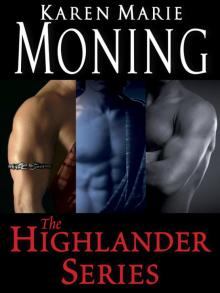 The Highlander Series 7-Book Bundle
The Highlander Series 7-Book Bundle![[Highlander 04] - Kiss of the Highlander Read online](http://i1.bookreadfree.com/i1/03/29/highlander_04_-_kiss_of_the_highlander_preview.jpg) [Highlander 04] - Kiss of the Highlander
[Highlander 04] - Kiss of the Highlander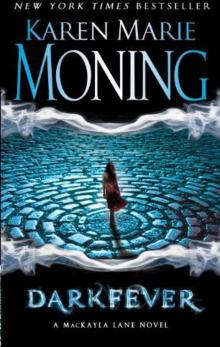 Darkfever_The Fever Series
Darkfever_The Fever Series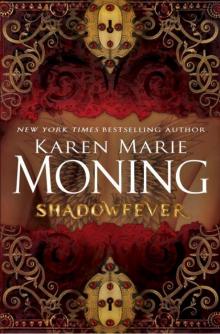 Shadowfever_Fever
Shadowfever_Fever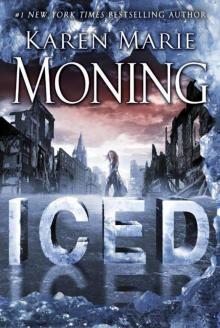 Iced: A Dani O'Malley Novel (Fever Series)
Iced: A Dani O'Malley Novel (Fever Series)![Fever [08] Feverborn Read online](http://i1.bookreadfree.com/i2/04/09/fever_08_feverborn_preview.jpg) Fever [08] Feverborn
Fever [08] Feverborn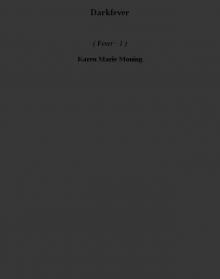 Darkfever f-1
Darkfever f-1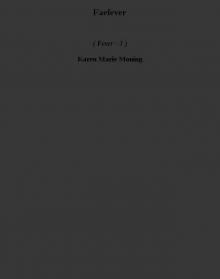 Faefever f-3
Faefever f-3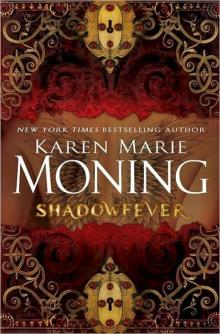 Shadowfever f-5
Shadowfever f-5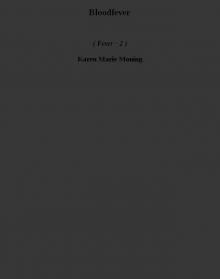 Bloodfever f-2
Bloodfever f-2